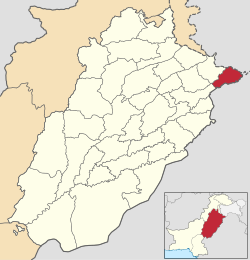Top Qs
Timeline
Chat
Perspective
Narowal District
District of Punjab in Pakistan From Wikipedia, the free encyclopedia
Remove ads
Narowal District (Punjabi and Urdu: ضِلع نارووال) is a district in the province of Punjab, Pakistan. Narowal city is the capital of the district. During the British rule, Narowal was the town of Raya Khas tehsil of Sialkot District. Narowal District formed in 1991, when the two tehsils of Narowal and Shakargarh were split off from Sialkot District.[3]
This article has multiple issues. Please help improve it or discuss these issues on the talk page. (Learn how and when to remove these messages)
|
Remove ads
Administration
The district is administratively divided into the following three tehsils (subdivisions), which contain a total of 74 Union Councils:[4]
Remove ads
Urban areas
The district has six urban areas.
Geography
The district is bounded by Sialkot District on the northwest , by India on the north, by Kathua district of Jammu and Kashmir, Gurdaspur and Pathankot districts on the southeast, Amritsar district on the south, and Sheikhupura district in Pakistan on the southwest.
Demography
Summarize
Perspective
Population
As of the 2023 census, Narowal district had a population of 1,950,954 which is roughly equal to the population of Santa Clara County, California, USA and Huangpu District, Guangzhou, China. There are 281,536 households. The district has a sex ratio of 104.40 males to 100 females and a literacy rate of 75.28%: 79.89% for males and 70.49% for females.[1][9] 494,799 (25.36% of the surveyed population) are under 10 years of age.[10] 349,095 (17.89%) live in urban areas.[1] According to the 2017 census, total population of District Narowal is 1.709 million. Male population is 0.853 m (49.96%) and female population is 0.855 m (50.04%).[permanent dead link] According to the 1998 census of Pakistan, Narowal District's population was 1,256,097, of which only 12.11% were urban.[11]
The total area of the district is approximately 2,337 square kilometres. Prior to the creation of Zafarwal Tehsil in July 2009,[12] Narowal Tehsil occupied 1,065 square kilometres while the remaining area (1,272 square kilometres) fell in Shakargarh Tehsil.
Religion
As of 2023, 97.48% of the population adheres to Islam whereas 2.22% adheres to Christianity. There is a small Hindu population in the district.[13]
Language
At the time of the 2023 census, 94.29% of the population spoke Punjabi, 3.05% Urdu and 2.28% Mewati as their first language.[16]
Remove ads
Education
Summarize
Perspective
District Narowal boasts a robust educational infrastructure, featuring a total of 1,609 schools that cater to students at the foundational and secondary levels. Higher education is supported by 35 colleges, which include 8 for boys, 4 for girls, and 3 dedicated commerce colleges, providing a range of academic and professional programs. In addition, the presence of 3 universities further enhances the opportunities for advanced studies and research, contributing significantly to the overall development of education in the area.[17]
Here is the list of universities & medical colleges in Narowal:
**University of Narowal (UoN) was previously the Narowal campus of University of Gujrat (UoG), but later on UoN became an independent university. Now there is no campus of UoG in Narowal.
Remove ads
Health
The following hospitals operate in Narowal district:
Notable people
- Dev Anand, Bollywood actor, director & producer
- Muhammad Tariq Anis: Ex MPA and MNA
- Daniyal Aziz, State Minister of Broadcasting
- Shiv Kumar Batalvi, Punjabi poet
- Anwar Aziz Chaudhry, politician
- Ijaz Ahmed Chaudhry, justice
- Faiz Ahmad Faiz, Pakistani revolutionary poet[20]
- Abrar-ul-Haq, singer-songwriter, philanthropist, politician
- Syed Saeed ul Hassan, Minister of Punjab for Auqaf and Religious Affairs
- Adnan Ilyas, cricketer
- Ahsan Iqbal, Interior Minister of Pakistan
- Chaudhry Muhammad Sarwar Khan, longest serving Parliamentarian in the history of Pakistan.
- Rajendra Kumar, Indian film actor, director, producer, recipient of Padma Shri (1969)
- Naseer Ahmad Malhi, one of the founding fathers of Pakistan and the first education minister of Pakistan
- Chaudhry Abdul Rahim, politician
- Des Raj, Indian cricket umpire
- Afzal Ahsan Randhawa, writer
- Gurbachan Singh Salaria, former Indian Army officer
- Kidar Sharma, Indian film director, producer, screenwriter, and Lyricist of Hindi films.
- Z. A. Suleri, political journalist
Remove ads
Constituencies
See also
References
External links
Wikiwand - on
Seamless Wikipedia browsing. On steroids.
Remove ads


